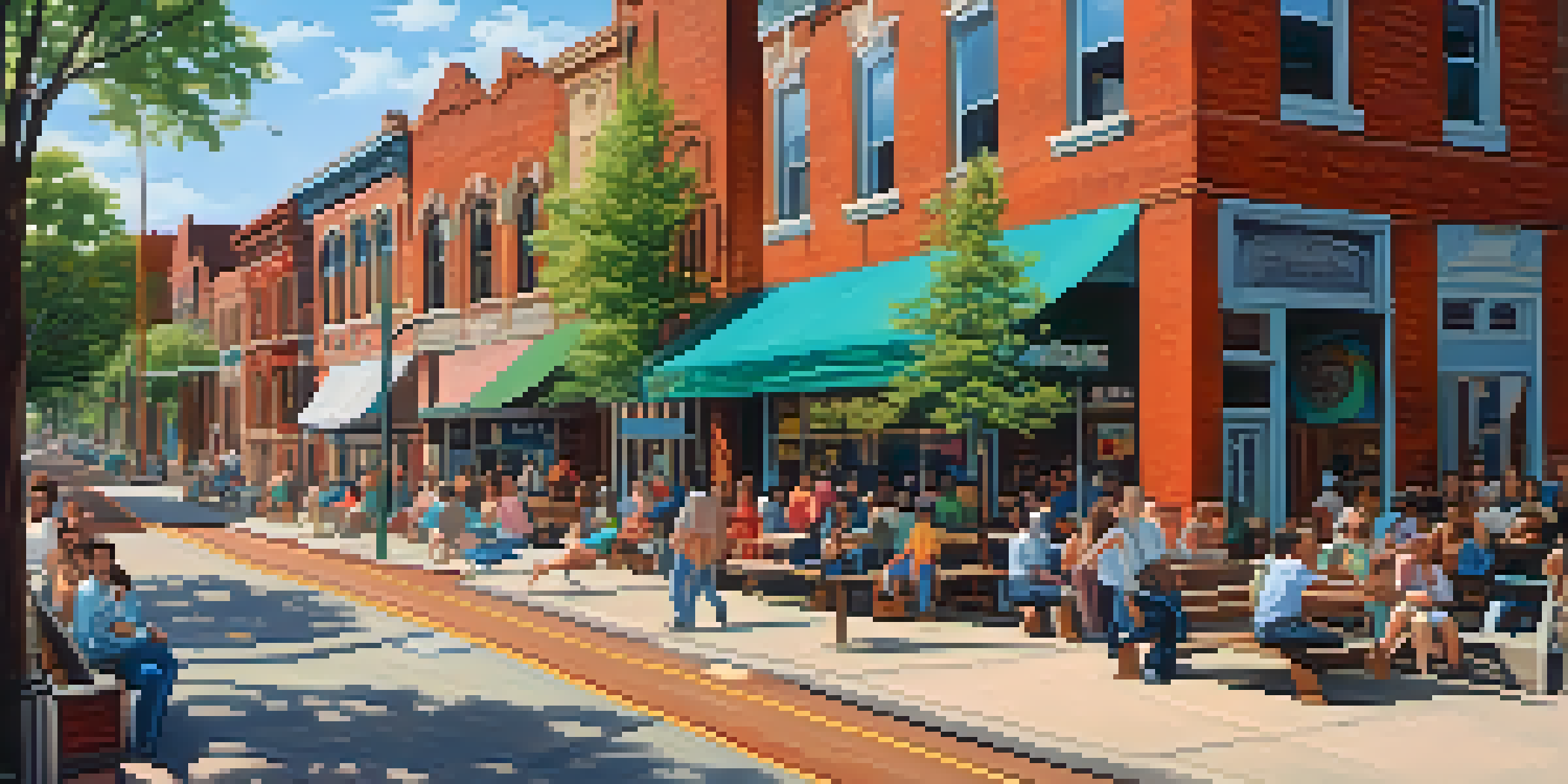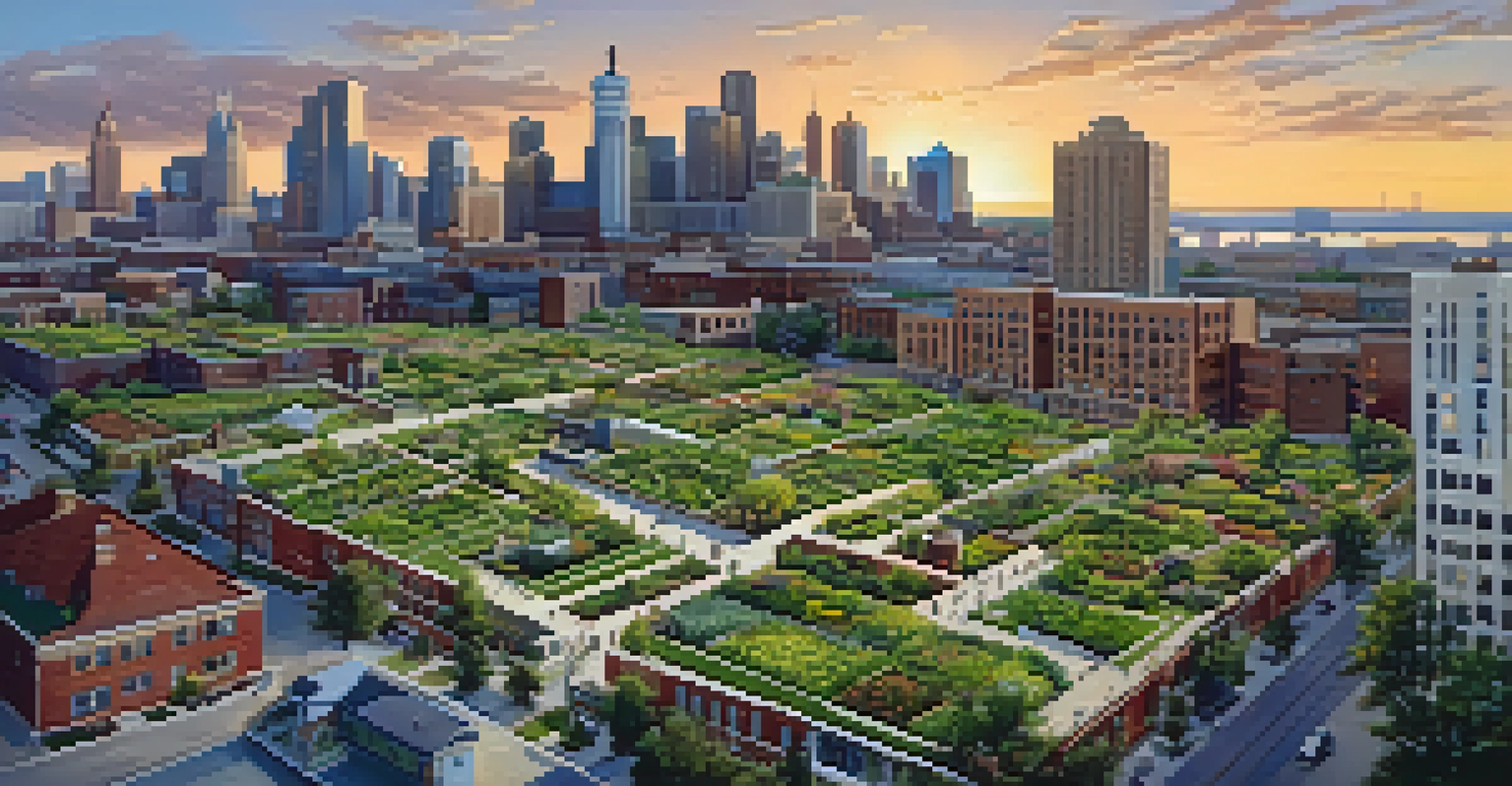Assessing Detroit's Economic Landscape: A Comprehensive Review

A Brief History of Detroit's Economy
Detroit's economy has undergone significant transformations over the decades, from its booming automotive industry in the early 20th century to its decline in the latter half. Once dubbed the 'Motor City,' Detroit became synonymous with manufacturing and innovation. However, the city's economic troubles peaked during the 2008 recession, leading to a drastic downturn that affected countless residents and businesses.
Detroit is a city with a rich history and an even brighter future.
Despite these challenges, Detroit has shown remarkable resilience. In recent years, the city has begun to pivot away from its traditional reliance on the automobile industry. This evolution has opened doors for new sectors, including technology, healthcare, and the creative industries, fostering a renewed sense of optimism among residents and entrepreneurs alike.
Understanding Detroit's economic history is crucial for grasping its current landscape. This backdrop sets the stage for the ongoing revival efforts that aim to restore the city’s economic vitality while honoring its rich heritage.
Current Economic Indicators and Trends
In assessing Detroit's economic landscape, several key indicators reveal a complex yet promising picture. The city's unemployment rate has steadily declined, now hovering around the national average, a sign of improved job opportunities. Additionally, the housing market has seen a resurgence, with property values rising as investors recognize the potential for growth in the area.

However, challenges remain, particularly in addressing income inequality and ensuring that all residents benefit from the economic recovery. The stark contrast between affluent neighborhoods and those still struggling can be disheartening. City leaders are working to bridge this gap through various initiatives aimed at workforce development and inclusive economic growth.
Detroit's Economy is Revitalizing
The city is experiencing a shift from its traditional auto industry towards diverse sectors like technology and healthcare.
Overall, these current indicators suggest a city in transition, grappling with both opportunities and obstacles as it forges a new economic identity.
Key Industries Driving Economic Growth
Detroit's economic revival is significantly driven by a diverse array of industries. While the automotive sector remains a cornerstone, technology and innovation have emerged as key players in the local economy. Tech startups and established firms are increasingly setting up shop in the city, drawn by its affordable real estate and vibrant culture.
Detroit is a city that has always been defined by its ability to innovate and adapt, even in the face of adversity.
Healthcare is another burgeoning field, with several major hospitals and research institutions investing in the region. This focus on health not only creates jobs but also improves the quality of life for residents. Furthermore, the creative sector, including art, music, and design, has gained traction, attracting a younger demographic that values urban living.
These industries collectively contribute to a more robust and varied economic landscape, fostering opportunities for collaboration and innovation among local businesses.
Challenges Facing Detroit's Economy
Despite the positive trends, Detroit faces several significant challenges that threaten to hinder its economic progress. One of the most pressing issues is the need for infrastructure improvements. Aging roads, public transport, and utilities require substantial investment to support both residents and businesses effectively.
Additionally, the city grapples with a skills gap in the workforce. While there are many job openings, not all residents possess the necessary training or education to fill these roles. This disparity underscores the importance of targeted educational programs and partnerships between businesses and local schools.
Challenges Persist in Economic Growth
Despite positive trends, issues such as infrastructure needs and workforce skills gaps remain crucial obstacles for Detroit.
Addressing these challenges is essential for ensuring that Detroit's economic growth is sustainable and inclusive, paving the way for a brighter future for all its residents.
The Role of Government in Economic Development
Government plays a crucial role in shaping Detroit's economic landscape through policies and initiatives aimed at revitalization. Local leaders have implemented tax incentives to attract businesses and stimulate investment in the city. These measures have already shown promising results, with increased interest from both national and international companies looking to establish a presence in Detroit.
Moreover, the city has prioritized development projects that focus on community needs, such as affordable housing, parks, and public spaces. By fostering a sense of community, these initiatives not only enhance the urban environment but also encourage residents to invest in their neighborhoods.
Through strategic planning and collaboration, the government can help create a more vibrant and sustainable economic ecosystem that benefits everyone in Detroit.
Community Initiatives and Local Engagement
Grassroots movements and community initiatives have become vital components of Detroit's economic revitalization. Local organizations are working tirelessly to empower residents, providing resources and support for entrepreneurship and small business development. These efforts are helping to cultivate a sense of ownership and pride among community members.
Additionally, initiatives focused on sustainability and environmental justice are gaining momentum. Projects aimed at urban farming and green spaces not only enhance the city's aesthetics but also promote local food production and community wellness. Such initiatives reflect a holistic approach to economic development, emphasizing the interconnectedness of community well-being and economic prosperity.
Community Initiatives Drive Change
Grassroots movements and local engagement are essential for fostering economic development and inclusivity in Detroit.
Community engagement is essential for ensuring that the voices of all residents are heard, creating a more inclusive and equitable economic landscape in Detroit.
The Future of Detroit's Economic Landscape
Looking ahead, Detroit's economic landscape appears to be on an upward trajectory, fueled by innovation and resilience. As new industries continue to emerge and existing sectors adapt, the city is poised to redefine its identity. The ongoing collaboration between government, businesses, and community organizations serves as a foundation for sustainable growth.
However, the road to recovery is not without its hurdles. Ensuring that economic benefits extend to all residents will require ongoing commitment and intentionality. By addressing disparities and fostering inclusivity, Detroit can build a more equitable economic future.

Ultimately, the future of Detroit's economy will depend on its ability to harness its rich history while embracing new opportunities. With determination and collaboration, the city can transform challenges into strengths, paving the way for a thriving community.